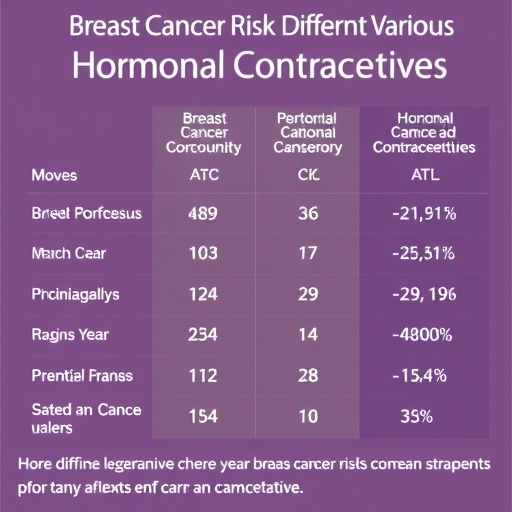A groundbreaking study from Uppsala University, Sweden, has unveiled nuanced distinctions in breast cancer risk associated with various hormonal contraceptive formulations. Leveraging an unprecedented dataset encompassing over two million women and adolescents across Sweden, researchers have delineated how different progesterone-based contraceptives impact breast cancer risk with striking specificity. This comprehensive observational analysis harnessed the power of Sweden’s national registers, renowned for their exhaustive prescription and cancer diagnosis data, enabling an unparalleled exploration into the long-term oncological safety of hormonal contraceptives.
Hormonal contraceptives have long been pivotal in reproductive health management, evolving from the early combined estrogen-progestin oral contraceptives to include myriad progestin-only options such as mini-pills, implants, hormonal coils, and injectables. The shift in contraceptive preferences towards progestin-dominant formulations necessitated a deeper understanding of their distinct pharmacodynamics and subsequent cancer risk profiles. Given the structural diversity and varying receptor affinities of different progestins, their tissue-specific effects, including on mammary tissue and tumorigenesis pathways, merit careful examination.
The Swedish team employed a rigorous observational methodology, tracking women aged 13 to 49 from 2006 to 2019, assessing breast cancer incidence relative to contraceptive type and duration of use. Importantly, the study parsed out risk concerning specific synthetic progestins, revealing considerable heterogeneity. Desogestrel, a frequently prescribed progestin, emerged as significantly associated with an elevated breast cancer risk. The data suggest that prolonged use of desogestrel-based contraceptives correlates with nearly a 50% increase in relative breast cancer risk, a figure that commands attention in clinical decision-making.
In contrast, formulations containing levonorgestrel, another widely used progestin in both combined oral contraceptives and hormonal intrauterine systems, exhibited a notably lower risk elevation, under 20%. This differentiation underscores the importance of molecular pharmacology and progestin receptor activity variations in mediating carcinogenic potential. Surprisingly, depot medroxyprogesterone acetate (DMPA) injections did not show a statistically significant increase in breast cancer risk, suggesting that not all progestin-based contraceptives uniformly influence oncogenic pathways in breast tissue.
The research further elucidates the temporal dimension of risk, highlighting that cumulative exposure duration compounds breast cancer incidence probability. Hormonal contraceptive users generally demonstrated a modest 24% increased risk compared to non-users, equivalent to approximately one additional breast cancer case per 7,800 users annually. Importantly, this risk is not static but escalates with extended contraceptive usage, emphasizing the necessity for personalized contraceptive counseling, particularly for women with inherent or familial breast cancer susceptibility.
This nuanced risk analysis carries profound implications for clinical practice. While hormonal contraceptives confer significant benefits including pregnancy prevention, management of dysmenorrhea, reduction in ovarian and endometrial cancer risk, and improvement of skin conditions, the oncological safety profile must be a critical consideration in contraceptive choice. The study advises careful selection of hormone formulations, suggesting that drospirenone-containing combined oral contraceptives may offer a safer risk profile for breast cancer, a vital insight for healthcare providers managing high-risk patients.
At the molecular level, synthetic progestins vary in their affinity for progesterone receptors and their metabolic by-products, which can differentially regulate gene expression linked to cell proliferation and apoptosis. Desogestrel’s higher potency and subtle differences in receptor modulation may underpin its association with increased neoplastic transformation in mammary epithelia. Conversely, levonorgestrel and drospirenone exhibit distinct molecular behaviors that could account for their comparatively lower carcinogenic signaling.
The importance of Sweden’s comprehensive health registries cannot be overstated in this endeavor. By linking dispensed prescription data to cancer registries nationwide, researchers circumvented many biases inherent in self-reported data, achieving robust, real-world evidence of contraceptive-associated breast cancer risk. This method also allowed for stratification by age, duration, and specific hormonal agents, generating granular insights that can inform global contraceptive guidelines.
From a public health perspective, this study reinforces the critical balance between the undeniable benefits of hormonal contraception and their associated risks. It propels an urgent call for intensified research into safer contraceptive molecules, the development of personalized medicine frameworks considering genetic and lifestyle factors influencing breast cancer susceptibility, and enhanced patient education to empower informed choices.
The findings also hold ramifications beyond breast cancer, as hormonal contraceptives interact with a range of systemic pathways. Understanding the differential oncogenic risks can inspire innovation toward selective progesterone receptor modulators (SPRMs) that attenuate breast tissue stimulation while preserving contraceptive efficacy. Future clinical trials might explore non-hormonal alternatives or adjunctive protective strategies to mitigate risk without sacrificing the benefits contraception provides.
In summary, this landmark study delineates a complex landscape where not all hormonal contraceptives are created equal regarding breast cancer risk. Desogestrel-based contraceptives, while efficacious, are linked to a more pronounced increase in breast cancer risk compared to levonorgestrel or drospirenone-containing options. These insights equip clinicians and patients with critical data to tailor contraceptive choices, particularly in populations predisposed to elevated breast cancer risk, thus optimizing long-term health outcomes through personalized reproductive healthcare.
Subject of Research: People
Article Title: Hormonal Contraceptive Formulations and Breast Cancer Risk in Adolescents and Premenopausal Women
News Publication Date: 30-Oct-2025
Web References: https://dx.doi.org/10.1001/jamaoncol.2025.4480
Image Credits: Mikael Wallerstedt
Keywords: hormonal contraceptives, breast cancer risk, desogestrel, levonorgestrel, progestin, observational study, Uppsala University, reproductive health, oncology, preventive medicine, molecular pharmacology, personalized contraception




